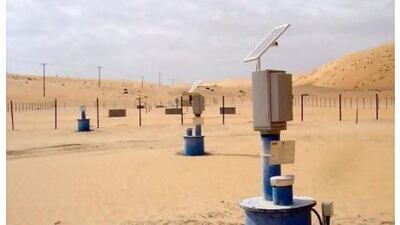A major data collection scheme spearheaded by environmental campaigners can help the UAE avoid a water crisis.
Water levels have been assessed at tens of thousands of wells as part of wide-ranging efforts to protect the vital natural resource.
The country's water consumption was recently branded a 'huge concern" by a UAE minister and the Emirates is among the world's 10 most arid states, while about 15 per cent of the planet's desalinated water is consumed here.
About 51 per cent of the UAE’s water supply comes from groundwater and demand is such that a UAE University report in 2015 warned that the country’s water supplies could be depleted within the next few decades.
But the UAE is turning a corner in its effort to ensure residents aren't left high and dry in the future.
With the world’s population expected to reach 9 billion by 2050, demand for diminishing natural resources like fresh water and fertile agricultural land will only increase.
Suhail Al Mazrouei, the UAE's energy minister, said Emirati homes alone consume 44 per cent of the country’s water consumption.
Emiratis constitute about 10 to 15 per cent of the population, depending on estimates.
Ahmed Baharoon, executive director of environmental science, information and outreach sector at Environment Agency Abu Dhabi, said using the correct data can help predict the future demands of UAE and help safeguard water supplies for future generations.
“Data is an important weapon these days, and it helps us to make good environmental decisions,” he said.
“Without it we would not have any information on how to best build our future.
“With the right environmental information, we can analyse data and predict what is likely to happen.
“The UAE is in a much better position now in this area than a decade ago.”
Results from a recent comprehensive groundwater assessment included extensive subterranean mapping and establishing of a wells inventory.
Since 2015, the project has had three phases, with a first ‘groundwater atlas’ developed to include a soil salinity survey of agricultural farms across the country.
By December 2017, researchers had collected data from 118,000 wells and 1,150 small scale desalination plants used for agriculture.
Water levels were measured and recorded in 40,000 wells, and feedback on water supplies offered from the Abu Dhabi Farmers Service Centre and the Abu Dhabi Food Control Authority.
The environment agency has added that information to a database for researchers to evaluate and assess crucial information on groundwater levels in the UAE.
“This information has changed our consumption behaviour, as we now know where our most valuable water sources are, and how we can preserve it for the future,” said Mr Baharoon.
“The UAE is very arid, and the lack of rain means there is not a reliable recharge mechanism.
“This data has made us more aware of the issues we are facing.
“Cloud seeding has made an impact, but we are not counting on it.
“We have a national strategic reserve in the Al Dhafra that is man-made and underground — an emergency supply should we need it.
“We have to adapt, be creative and innovative to live and prosper in this region.”
_____________________
Read more:
Neighbourhood Watch: Farming grows sense of community at Dubai's Sustainable City
World not doing enough to combat disastrous climate change
Indian farmer's growing unrest raises concerns
_____________________
Emergency water supplies are collected at the Liwa Strategic Water Reserve, considered the largest global project of its kind.
An underground layer of water-bearing permeable rock, or aquifer, can be used as a source of water extraction.
The Liwa aquifer is recharged with desalinated water to refresh the groundwater quality, increasing freshwater reserves.
The total injected desalinated water, or stored water, is about 25.5 million cubic metres, equivalent to providing around 180 litres a day for the population of Abu Dhabi for 90 days, in case of an emergency.
In December 2017, the project was updated with a new system of recharge basins, recovery wells, pipelines, surface tanks and pumping stations.
The improvements have allowed the aquifer to be pumped with 31,822 cubic metres of desalinated water a day over a two-year period to strengthen reserves, and serve the needs of the Northern Emirates and Al Ain in an emergency.
Worldwide, the UN estimates 2.1 billion people lack safely managed drinking water, while 4.5 billion lack access to safely managed sanitation.
Speaking at the United Nations Global Data Forum, the UN environment department said global populations were edging closer towards a water crisis.
“Billions of people still lack safe water, sanitation and handwashing facilities,” said Alexandre Caldas, chief of country outreach, at UN Environment.
“Increasing wastewater in many parts of the world is profoundly affecting the quality and amount of water available to meet human needs and sustain ecosystems.”


